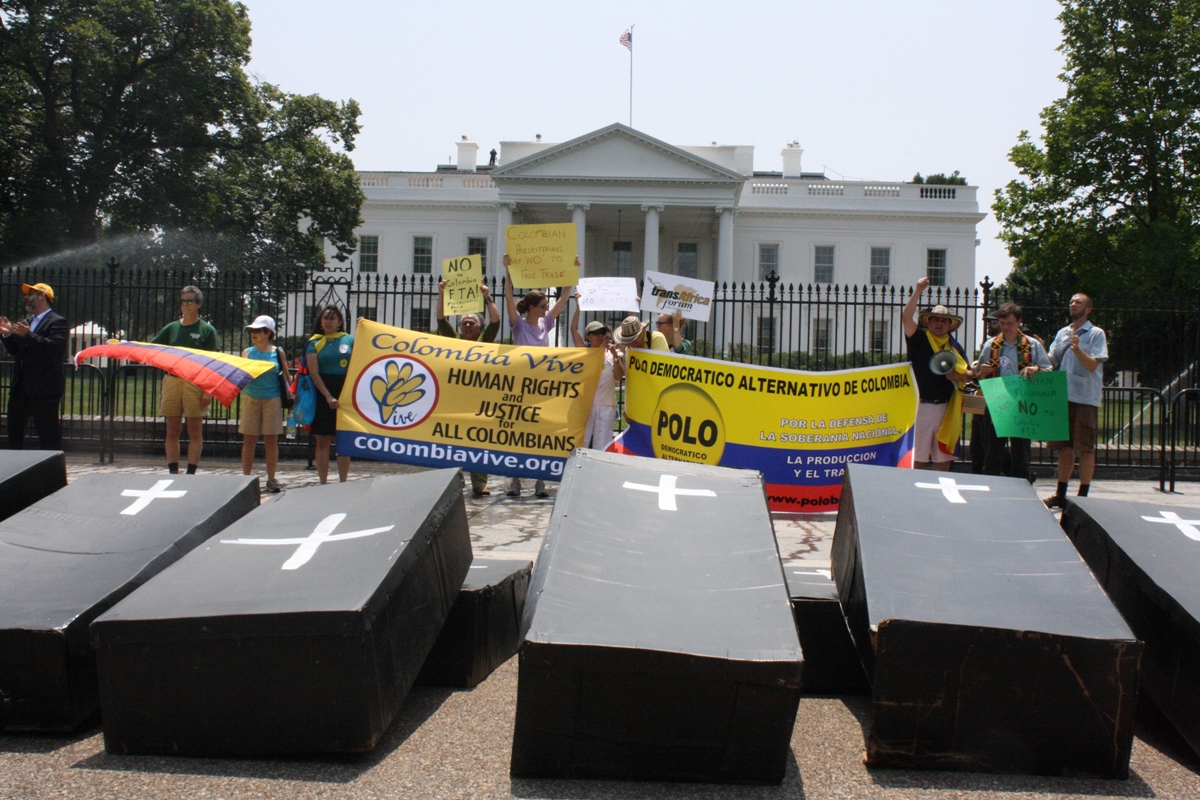
MEDELLIN, Colombia – Colombia’s Zona Cafetera, or coffee zone, is one of the most prominent providers of coffee in the world. But a predicament now faces its native producers – who never even taste the coffee – and threatens to destroy them. A lop-sided trade dealreached two years ago with the United States, known as the U.S.-Colombia Trade Promotion Agreement (CTPA), is considered a primary cause of the recent farmer strikes that swept the country. But a more direct factor to consider is the threat posed by giant multinationals like Nestlé.
Part of the problem is the result of creating an extreme monoculture. Many of Colombia's rural areas contain nothing but hundreds of miles of mountains full of coffee farms. The monocrop system doesn't necessarily benefit the individual farmers, but it is the way multinational corporations function. Large companies refuse to work with farmers who produce other crops with their land, using only a small portion for coffee plants on the side. Rather, the companies take huge amounts of coffee from a few very large producers.
Free market economists claim that entering into a bulky, international purchase benefits both parties: the idea being the more you sell the more you make, despite selling at a lower price. However, in this case, farmers don't necessarily get the best price for their product as they find themselves in the tight grip of the big coffee firms.
Nestlé has a huge presence in Colombia. But it has no fair trade policy to ensure its coffee producers are paid a living wage. According to Oxfam, the farmers are paid around 24 cents per pound of coffee beans. Consumers in rich countries pay $3.60 for that same amount: an extraordinary mark-up of 1,500%.
Nestlé is also accused of employing aggressive tactics in regards to unions. According to the Sinaltrail (National Union of Food Industry Workers): “Nestlé creates terror in the community, destroys the unity of the workers and misinforms the members of the union.”
All of this has put Colombia's coffee farmers in a precarious position. If firms like Nestlé decide suddenly to offer them less cash, there is nothing they can do because they are dependent on their mega-buyers. And because those farmers are now economically forced to plant only coffee beans, they are losing knowledge about other, previous farming techniques and the ways to use their land to produce varieties of crops and livestock.
In addition, farmers here are now dependent on the world price of coffee — and are getting undercut by recent developments in Asia, especially. Vietnam, Cambodia and others in the region are lately getting serious about growing and exporting coffee, and global prices are plummeting as a result. Colombian farmers now receive just half of what they were paid for beans only a few years ago. Some are so underpaid they can no longer buy food to support their families.
One export-quality brand of coffee available in Colombia, and recognized worldwide, is Juan Valdez. The firm has its own cafes and a monopoly, in some places, on the middle-class coffee-drinking market. Yet most Colombians cannot afford it. Occupy.com spoke with British-born employee Solomon Slade, who works on a coffee farm in Chinchiná, a tiny town 12 hours by bus from Colombia’s capital, Bogotá.
“The saddest thing is that the vast majority of the country’s highest quality coffee is sold for export," Slade said. "The perception of Colombia is [that it has] great coffee. But most Colombians buy very bad quality coffee. You’re more likely to find better brands in a supermarket in London.”
“It is a shame to hear farmers talk about their best produce as ‘export-quality’. Farmers rarely taste it themselves, they don’t know much about what they’re producing," he added. "They tend to buy coffee to drink from small shops rather than dry and roast their own beans; they sell their coffee without realizing they could hold back some of their produce, grind it up and drink it themselves. Their way ends up more expensive. It costs more to sell their product in bulk and then buy bad quality brands from a Colombian supermarket.”
There are a few positives in the relationship with Nestlé. The company only works with farmers who do not deforest all of their land, as chopping down too many trees would cause ecological problems for both parties down the line. The firm also offers suggestions about the least harmful pesticides farmers can use on their crop, and they help provide education in farming techniques.
Nonetheless, Colombian producers are struggling to support their families. And as their situation worsens year to year, due to the plummeting world coffee of price and farmers' reliance on huge corporations like Nestlé, more strikes like the ones carried out in recent months can be expected events in the future.
3 WAYS TO SHOW YOUR SUPPORT
- Log in to post comments
















